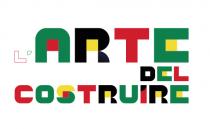L'École Centrale de Lyon, l'INSA de Lyon et l'ENSAL, en partenariat avec l’Institut Culturel Italien de Lyon, proposent une semaine de visites, conférences et débats.
La thématique :
Regards croisés France-Italie sur les métiers de l’ingénieur et de l’architecte. Techniques de constructions : influences et différences entre la France et l’Italie.
Ingegnere e architetto, mestieri a confronto tra Italia e Francia. La tecnica del costruire tra Italia e Francia: influenze e differenze.
Programme
Mercredi 12 février 15h30-17h
Visite découverte « L’architecture du musée des Confluences ». Les mots de l’architecture dans la langue italienne.
En italien, 20 places. // COMPLET
Samedi 15 février 11h30-13h30
Visite guidée « La présence italienne dans le Vieux Lyon »
En français, 30 places. Visite organisée par la Bibliothèque Michel Serres de l’École Centrale de Lyon. Informations et réservations Arnaud Dubos.
Mardi 18 février 12h30-14h
Conférence « The Language of structures. The Italian School of Engineering »
A journey through the history of structural engineering in Italy from the middle of the nineteenth century, throughout the twentieth century
Par Tullia Iori, historienne de l'ingénierie des structures, ingénieure, professeure de l’Université de Rome « Tor Vergata ».
Cette conférence sur l’architecture du XXe siècle en Italie est en partenariat avec L’Institut Culturel Italien dans le cadre de l’Italian Design Day.
The Language of structures. The Italian School of Engineering » by T. Iori: The lecture, which is based on the results of SIXXI research - History of structural engineering in Italy- tells the extraordinary adventure of designers, scientists, bridges and domes that have made famous the Italian engineering. A journey that starts from the middle of the nineteenth century and takes place along the twentieth century: a compelling story, at times glorious, and still unique. Just think of those years of economic miracle, when the works of Italian engineers (the most famous Pier Luigi Nervi and Riccardo Morandi, but also overlooked designers as Silvano Zorzi, Sergio Musmeci, Giulio Krall, Gino Covre and many more), were a point of strength of "Made in Italy" and made a crucial contribution to the development of modern engineering in the world. A collection of mostly unpublished photography along with original documents illustrates their story. These unique pieces were collected in archives all over Italy to renew the figurative art of structural engineering.
En anglais (avec 15 min en italien), entrée libre. École Centrale de Lyon, bâtiment W1, amphi 2.
Mercredi 19 février 18h30-20h
Conférence « Unprecedented 19th-century tunnels designed by the French-Italian school of engineering »
On the emergence of the Italian tunneling School and its connections with French engineers and managers, from the historical and technical perspectives
Par Carlo Callari, ingénieur, professeur de l’Université du Molise, Italie
Unprecedented 19th-century tunnels designed by the French-Italian school of engineering » by C. Callari : The lecture deals with the birth of the Italian Tunneling School, including reference to the contribution of several French engineers and managers. The attention is focused not only on ingenuity and innovation of design and construction techniques, but also on the historical function of 19th-century tunnels in strengthening the relations between Italy and Europe, as well as in bridging the internal gaps, e.g. between the north and south of Italy. As representative cases of the impressive Italian plan of infrastructural development in the second half of the 19th century, we firstly illustrate the rehabilitation and upgrading of the outlet tunnel of Fucine lake (1871), originally excavated by Romans (54 AD). Then, we consider the Marianopoli (1885) and Magazzinazzo (1881) tunnels of the Vallelunga Railway Line, in Sicily, and the two tunnels underpassing the “Colle di Tenda” (carriage 1882, railway 1898), in Piedmont.
En anglais (avec 15 min en italien), entrée libre. École Centrale de Lyon, bâtiment W1, amphi 2.
Jeudi 20 février
12h30-13h45 - Cité internationale de Renzo Piano : visite guidée et rallye photo.
Groupe 1 : Visite guidée par Paul Vincent, ayant dirigé le projet de la Cité Internationale pour Renzo Piano Building Workshop.
En français, 30 places. // COMPLET
Groupe 2 : Rallye photo organisé par GAIA (association des élèves de l’INSA en double cursus ingénieur-architecte avec l’ENSAL).
En français, 30 places. // COMPLET
14h-14h30 - Pause café
Hall du bâtiment Freyssinet, INSA.
14h30-16h30
Conférence-débat « À la recherche du bon sens. La nécessité d’ateliers pluridisciplinaires partagés pour inventer une Ville Heureuse. »
Rapide historique de la Cité Internationale et présentation du projet et des innovations pour la tour Intesa San Paolo de Turin.
Par Paul Vincent architecte, enseignant ENSAL, chercheur au LAURe.
Conférence suivie d'un débat et d'une discussion animée par Luna d’Emilio, architecte enseignante à l’ENSAL, sur le métier de l'architecte et les études d'architecture en Italie.
À la recherche du bon sens. La nécessité d’ateliers pluridisciplinaires partagés pour inventer une Ville Heureuse. » par P. Vincent : Rapide historique du projet de la Cité Internationale de Lyon.
Projet de la tour bio-climatique Intesa SanPaolo de TURIN conçu à Paris avec une équipe Architectes et Ingénierie franco-italo-anglaise (emblématique en termes de cultures de projet mobilisés) sous sa direction chez RPBW avec Renzo Piano (tour leed platinium) .
Présentation de ses innovations pour la tour Intesa San Paolo, en particulier sur la ventilation naturelle régulée (afin d'éviter au maximum la climatisation).
Un point de vue sur les évolutions à apporter pour une conception pluridisciplinaire de projets d'architecture et d'urbanité vertueuses.
Un avis sur les problèmes nécessaires d'évolutions du cadre administratif, juridique et politique actuel des projets.
En français, entrée libre. Amphithéâtre Freyssinet, INSA.
